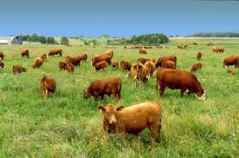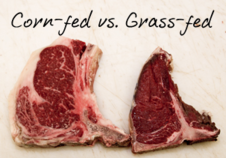Really, How Much Better Is Grass-Fed Beef?
Article by Dr. Frank Lipman, healthy living.
Dr. Lipman is an integrative and functional medicine physician, founder of Eleven Eleven Wellness in NYC and the creator of Be Well by Dr. Frank Lipman. In his monthly column for R29, he'll talk about the latest health and wellness news; his favorite stay-healthy tips and tricks; plus, answer your questions on how to be your healthiest, best self, every day.
With all the hype around the term "grass-fed," you may be wondering - what exactly does it mean, and is grass-fed beef really that much better? The answer is a definite YES. For those who choose to eat meat, grass-fed is definitely the better way to go for your body, the environment, and the animals. Although factory-farmed meat may be cheaper and easier to get your hands on, it's really in your best interest to treat your body right and make the extra effort to find grass-fed.
What's the story?
Traditionally, all meat was grass-fed. Cows
are ruminants, with a multichambered stomach uniquely designed to digest grasses. Now, the majority of meat in America comes from
factory-farmed cows that are raised on corn. The diet is designed to keep prices low while producing as much meat as possible. The
cattle aren't meant to be on a corn-based diet, and eating this way causes acidosis - turning their stomachs to become unnaturally acidic. Acidotic animals experience ulcers, diseases, and weakened
immune systems, and they have to be fed large amounts of antibiotics to survive the harsh, toxic conditions of their confinement.
They are fed corn until they are obese enough to be slaughtered.
To make matters worse, most corn grown in America is genetically modified to resist herbicide, contains extremely high levels of starch, and is sprayed with ammonia fertilizer. Because of this, when
you eat grain-fed meat, it's not only full of antibiotics, it's packed with chemicals and is the product of very sick cows.
How are we affected by the antibiotics used in grain-fed meat?
Eighty percent of all antibiotics in the United States are used for livestock feed. According to a report by the Environmental Working
Group, a significantly high amount of meat in the U.S. contained high levels of antibiotic-resistant bacteria (known as "superbugs"). These superbugs can cause infections and complications
that are very difficult to treat and can spread antibiotic resistance - meaning the medicine needed to treat sick people may become ineffective.
How does this affect the nutrition of the meat?
Conventionally raised, grain-fed meat is completely different than grass-fed in terms of nutrition. To make meat production even
cheaper, conventionally raised cattle feed may even contain "by-product feedstuff" - garbage, stale cookies, poultry manure, chicken feathers, bubble gum, and restaurant waste. Their diet ultimately
becomes your diet, and the "meat" you're consuming isn't really even truly meat anymore. Appetizing, right?
These cows are living extremely far away from the environment in which nature intended for them. Taking cows away from their natural diet of grasses and
switching to grains lowers the nutritional value of the meat significantly. Grass-fed meat is high in omega-3s, which can help to heal inflammation, while grain-fed is high in omega-6s and
pro-inflammatory. Grain-fed meat also ends up being much higher in saturated fat, while grass-fed is higher in conjugated linoleic acid (CLA), a good fatty acid that reduces the risk of cancer,
diabetes, and obesity.
So what should you look for?
Bottom line? You should always look for beef, butter, and dairy products from grass-fed cows. You should choose meat that is 100% grass-fed and grass-finished - meaning they were fed grass for their entire lives, and no grains or animal by-products were ever fed to them. Meat can be labeled organic and still be grain-fed, so if you're not sure, it can be a great idea to actually contact the farmer or producer and ask if the animals were 100% grass-fed for their entire lives. If it doesn't say grass-fed, assume it's grain-fed. Many local meat suppliers and farmers' markets offer grass-fed beef, so be sure to check out the American Grass-Fed Association or EatWild.com to find grass-fed producers in your area. It's worth it!
Four great reasons to eat organic, grass-fed beef
Article from natural News by Scott Morefield
May 08, 2012
Vegetarians and vegans can put up quite the convincing argument when it comes to what they are passionate about - not eating meat. Several have even appeared on this site. With all due respect to them, in the interest of fairness there is another side to the story. Humans are omnivores designed to use both animals and plants as food. Entirely removing one or the other can not only be detrimental to human health, but, if done on a mass scale, could even have environmental consequences.
While everyone certainly has the right to freedom of conscience and one could go about making a credible case against eating meat from a humane perspective, it should be noted that many of the health-related arguments are essentially straw-men set up for an easy knock-down. For example, conventional, factory-farmed beef today is full of antibiotics, tumors, and growth hormones (not to mention ammonia laced pink-slime in some cases), all of which have an ill-effect on human health. Making an argument against beef by bringing up the many health dangers related to consuming the artificial toxins therein is akin to saying one should not ever swim in water because chlorine can be harmful. What does the excess chlorine in the local YMCA swimming pool have to do with swimming in a clean lake? So, of course, any argument in favor of beef (or meat in general) assumes it is organic and fed as nature intended.
Here are four great reasons to consume organic, grass-fed beef, There are certainly more, but these are a great start.
1.) Beef is full of the fats humans need.
Fat can be a good thing! About half the fat found in beef is oleic acid, a heart-healthy monounsaturated fat found in olive oil. The fat in beef that is saturated has been shown to decrease heart-attack risk by lowering bad cholesterol (LDL).
Beef is rich in omega-3 fatty acids, cancer fighting compounds that can play a tremendous role in overall cellular health as well as brain development. Further, grass-fed animals are richer in omega-3 than grain-fed because sixty percent of the fat content of grass is made up of omega-3.
2.) Beef is full of the proteins humans need.
Proteins are essential for life. Unlike plants, beef and other animal foods are a source of 'complete protein,' because they contain all the essential amino acids that the human body needs for life, yet can't produce on its own. While these amino acids can be derived from plants, it takes the proper combinations and proportions to consume what the body needs and can easily digest from meats.
3.) Beef is full of many important nutrients humans need.
Beef is a one-stop-shop, a rich source of B vitamins, zinc, iron, potassium, phosphorus, selenium, magnesium, etc.
4.) Grass-fed beef is good for the environment.
Grass-fed cows that are rotationally grazed, or moved from one area of the pasture to another, actually improve overall biomass by only eating the grass stem instead of the whole stalk, allowing the grass to grow back faster. Thus, cows convert something that humans cannot consume, grass, into something useful. Since grass is nurtured by the sun, cows essentially convert the sun's energy into food energy for humans!
Further, the moderate trampling the rotating pasture endures creates rich humus by working manure and organic matter back into the soil, creating a healthier, more vibrant grass with roots that help retain microbes and water, thus keeping more carbon dioxide underground.
So, in a way, eating organic, grass-fed beef can help save the planet. Now that's one Green initiative we can all stick our forks into!
More important reading:
Processed meats too dangerous for human consumption





